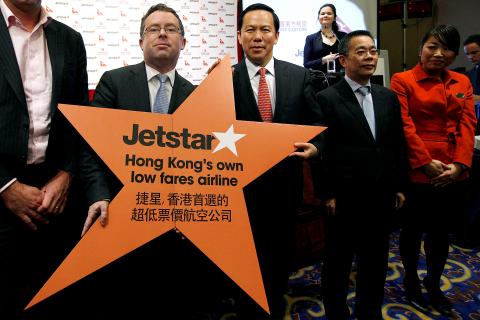Australian flagship carrier Qantas and China Eastern Airlines (中國東方航空) said yesterday they would launch a new Hong Kong-based budget airline next year, aimed at cashing in on China’s booming aviation market.
The new low-cost Asian carrier, Jetstar Hong Kong, will fly short-haul routes, including in China, Japan, South Korea and Southeast Asia, the partners announced.
The move marks a major expansion of Jetstar, Qantas’ budget brand, which flies domestic Australian and Asian routes, and comes as the embattled carrier struggles to refocus on Asia, the world’s fastest-growing aviation market.

Photo: Reuters
“This is a unique opportunity to capitalize on the enormous potential of the Greater China market, where the penetration of low-cost carriers is less than 5 percent,” Jetstar CEO Bruce Buchanan said.
“Jetstar’s fares will be 50 percent less than [those of] existing full-service carriers, which we’ve seen create new travel demand in our markets across Asia because it enables people to make more trips, more often,” he said.
Qantas and China Eastern — which will each have an equal stake in Jetstar Hong Kong — told the Australian Stock Exchange that the new airline would have a maximum capitalization of US$198 million.
Jetstar Hong Kong, which will be a pioneer in the China budget market, will launch with a fleet of three Airbus A320s, but will increase that number to 18 by 2015.
“We believe there are huge opportunities in the Jetstar low-fares model throughout Asia, including Greater China,” Shanghai-based China Eastern Airlines chairman Liu Shaoyong (劉紹勇) said.
Greater China boasts a travel market of almost 300 million passengers a year, which is forecast to grow to 450 million by 2015 as middle-class spending and travel surge in the vast nation, according to Qantas.
The announcement comes little more than a fortnight after Qantas’ Asian plans were dealt a blow when talks with Malaysian Airlines over a premium joint-venture Asian airline collapsed.
Qantas is instead moving to build on the successful business model of budget Jetstar, which has branded operations in Singapore, Vietnam and Japan, by boosting traffic through more affordable travel.
“We see tremendous potential for the Qantas Group in Asia and we’re looking forward to working more closely with China Eastern Airlines to deliver on it,” Qantas chief executive Alan Joyce said.
Jetstar Hong Kong’s base will give it a springboard into China and a home in one of Asia’s key aviation hubs, through which about 40 million passengers pass each year.
“The number of Chinese people traveling internationally is growing at an incredible rate,” said John Lee, chief executive of the Tourism and Transport Forum, an Australian tourism lobby group, welcoming the announcement.
“An estimated 70 million Chinese traveled overseas in 2011 and that’s expected to grow to 110 million by the end of the decade as household incomes continue to rise,” he said.
Investors also welcomed the news, with Qantas’ share price jumping 2.6 percent to A$1.775 after the announcement.

WEAKER ACTIVITY: The sharpest deterioration was seen in the electronics and optical components sector, with the production index falling 13.2 points to 44.5 Taiwan’s manufacturing sector last month contracted for a second consecutive month, with the purchasing managers’ index (PMI) slipping to 48, reflecting ongoing caution over trade uncertainties, the Chung-Hua Institution for Economic Research (CIER, 中華經濟研究院) said yesterday. The decline reflects growing caution among companies amid uncertainty surrounding US tariffs, semiconductor duties and automotive import levies, and it is also likely linked to fading front-loading activity, CIER president Lien Hsien-ming (連賢明) said. “Some clients have started shifting orders to Southeast Asian countries where tariff regimes are already clear,” Lien told a news conference. Firms across the supply chain are also lowering stock levels to mitigate

IN THE AIR: While most companies said they were committed to North American operations, some added that production and costs would depend on the outcome of a US trade probe Leading local contract electronics makers Wistron Corp (緯創), Quanta Computer Inc (廣達), Inventec Corp (英業達) and Compal Electronics Inc (仁寶) are to maintain their North American expansion plans, despite Washington’s 20 percent tariff on Taiwanese goods. Wistron said it has long maintained a presence in the US, while distributing production across Taiwan, North America, Southeast Asia and Europe. The company is in talks with customers to align capacity with their site preferences, a company official told the Taipei Times by telephone on Friday. The company is still in talks with clients over who would bear the tariff costs, with the outcome pending further

Six Taiwanese companies, including contract chipmaker Taiwan Semiconductor Manufacturing Co (TSMC, 台積電), made the 2025 Fortune Global 500 list of the world’s largest firms by revenue. In a report published by New York-based Fortune magazine on Tuesday, Hon Hai Precision Industry Co (鴻海精密), also known as Foxconn Technology Group (富士康科技集團), ranked highest among Taiwanese firms, placing 28th with revenue of US$213.69 billion. Up 60 spots from last year, TSMC rose to No. 126 with US$90.16 billion in revenue, followed by Quanta Computer Inc (廣達) at 348th, Pegatron Corp (和碩) at 461st, CPC Corp, Taiwan (台灣中油) at 494th and Wistron Corp (緯創) at

NEGOTIATIONS: Semiconductors play an outsized role in Taiwan’s industrial and economic development and are a major driver of the Taiwan-US trade imbalance With US President Donald Trump threatening to impose tariffs on semiconductors, Taiwan is expected to face a significant challenge, as information and communications technology (ICT) products account for more than 70 percent of its exports to the US, Chung-Hua Institution for Economic Research (CIER, 中華經濟研究院) president Lien Hsien-ming (連賢明) said on Friday. Compared with other countries, semiconductors play a disproportionately large role in Taiwan’s industrial and economic development, Lien said. As the sixth-largest contributor to the US trade deficit, Taiwan recorded a US$73.9 billion trade surplus with the US last year — up from US$47.8 billion in 2023 — driven by strong